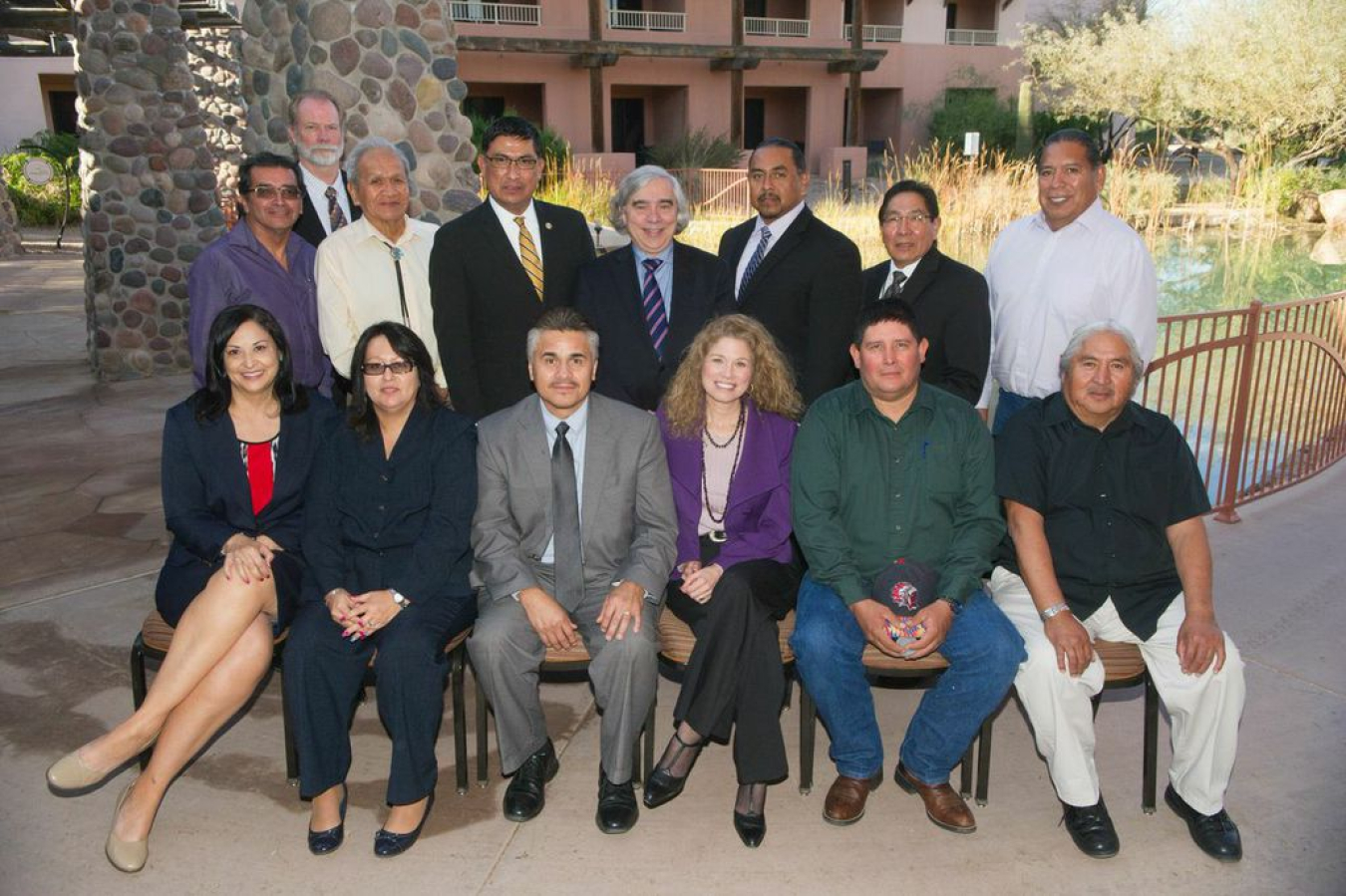Secretary Moniz traveled to Arizona last week for a summit with tribal leaders, part of our work to build upon President Obama’s commitment to strengthen the government-to-government relationship with tribal nations.
December 16, 2014
U.S. Secretary of Energy Ernest J. Moniz poses with attendees to a welcome lunch for Arizona tribal leaders. | Photo by Peter Jordan Photography.
Building on President Obama’s commitment to strengthen the government-to-government relationship with tribal nations, Secretary Moniz traveled to Arizona last week for a summit and roundtable dialogue with tribal leaders. This marks the first official visit of a Cabinet Secretary with tribal leaders in Indian Country after the White House Tribal Nations Conference earlier this month.
As a co-chair of the White House Council on Native American Affairs Energy Sub-Group, the Energy Department is working with tribal leadership to foster an ongoing and meaningful dialogue that Secretary Moniz will see through the national Tribal Energy Conference taking place in Washington in the spring of 2015 and far beyond.
As Secretary Moniz’s first official visit to Arizona and the Gila River Indian Community’s reservation, he took this opportunity to discuss the importance of science, technology, engineering and math (STEM) education for Native American youth as a means of building hope for the future, building resilient economies for tribal governments and building strong native nations for future generations.
The Energy Department’s Office of Economic Impact and Diversity will host a roundtable discussion this spring regarding STEM education to kick off a national dialogue in Indian country. The Department is also supporting the American Indian Science and Engineering Society’s (AISES) effort to enter a Native American team in the National Science Bowl competition. The AISES Executive Director, Sarah Echo-Hawk, is also a Minorities in Energy Ambassador for the Energy Department.
At the Summit, Secretary Moniz met with more than 25 students on the Arizona State University (ASU) campus representing ASU, Northern Arizona University and the University of Arizona. Each student presented his or her research to the Secretary in one-on-one poster presentations. The first students to present their research, however, came from the Salt River Pima-Maricopa Indian reservation's fourth and fifth grade robotics class.
On the second day of the summit, Secretary Moniz met with tribal leadership on Energy Department working groups covering issues ranging from environmental cleanup to energy policy and resilience. Secretary Moniz also announced the formalization of the Nuclear Energy Tribal Working Group (NETWG), providing a forum for tribal leaders to engage with the Department on a wide scope of nuclear energy issues.
As Secretary Moniz and the Department of Energy’s Office of Indian Energy look forward to the national Tribal Energy Conference, the Department is committed to broadening the dialogue with tribal leaders, building and strengthening more partnerships and exploring more opportunities and solutions with tribes across the nation.
David F. Conrad
![_KSA1022lr[4].jpg](/sites/default/files/styles/full_article_width/public/_KSA1022lr%5B4%5D_0.jpg?itok=6KQaTJWy)
David F. Conrad (Osage Nation) serves as the acting director and deputy director for the U.S. Department of Energy Office of Indian Energy Policy and Programs. He recently served as the Director of the Office of Public Affairs for the Assistant Secretary of Indian Affairs in the Department of Interior (DOI), managing press relations, digital media, and communications in close coordination with the Secretary’s Office of Communication and other DOI Bureaus. In the past, Mr. Conrad also worked as the Department’s Director for Tribal and Intergovernmental Affairs in the Office of Congressional and Intergovernmental Affairs, where he was responsible for intergovernmental affairs with tribal, city, and county governments.
Mr. Conrad represented the Department on federal interagency working groups such as Strong Cities, Strong Communities; improving Sacred Sites protection; and the White House Council on Native American Affairs, and coordinated Department-wide implementation of its federal Indian Policy including increasing working knowledge of strengthening positive working relationships with tribal governments on issues related to the Department's scientific, energy development, environmental cleanup, and national security mission.
Mr. Conrad has 20 years of intergovernmental affairs experience in the energy, environmental, economic development, and natural and cultural resources arenas. Mr. Conrad has served in intergovernmental, legislative, and public affairs positions supporting tribal and local governments, and has experience working with legislative bodies at the federal, tribal, state, and local levels. He has also held executive leadership positions in the non-profit sector with the National Tribal Environmental Council and the Council of Energy Resource Tribes.
Mr. Conrad holds a Bachelor of Arts in Political Science from Santa Clara University and a master’s degree in Environmental Policy and Administration from the University of Wisconsin at Green Bay.
-
In this "Meet Our Team” blog series, we introduce David Conrad, the Deputy Director of the Office of Indian Energy.

